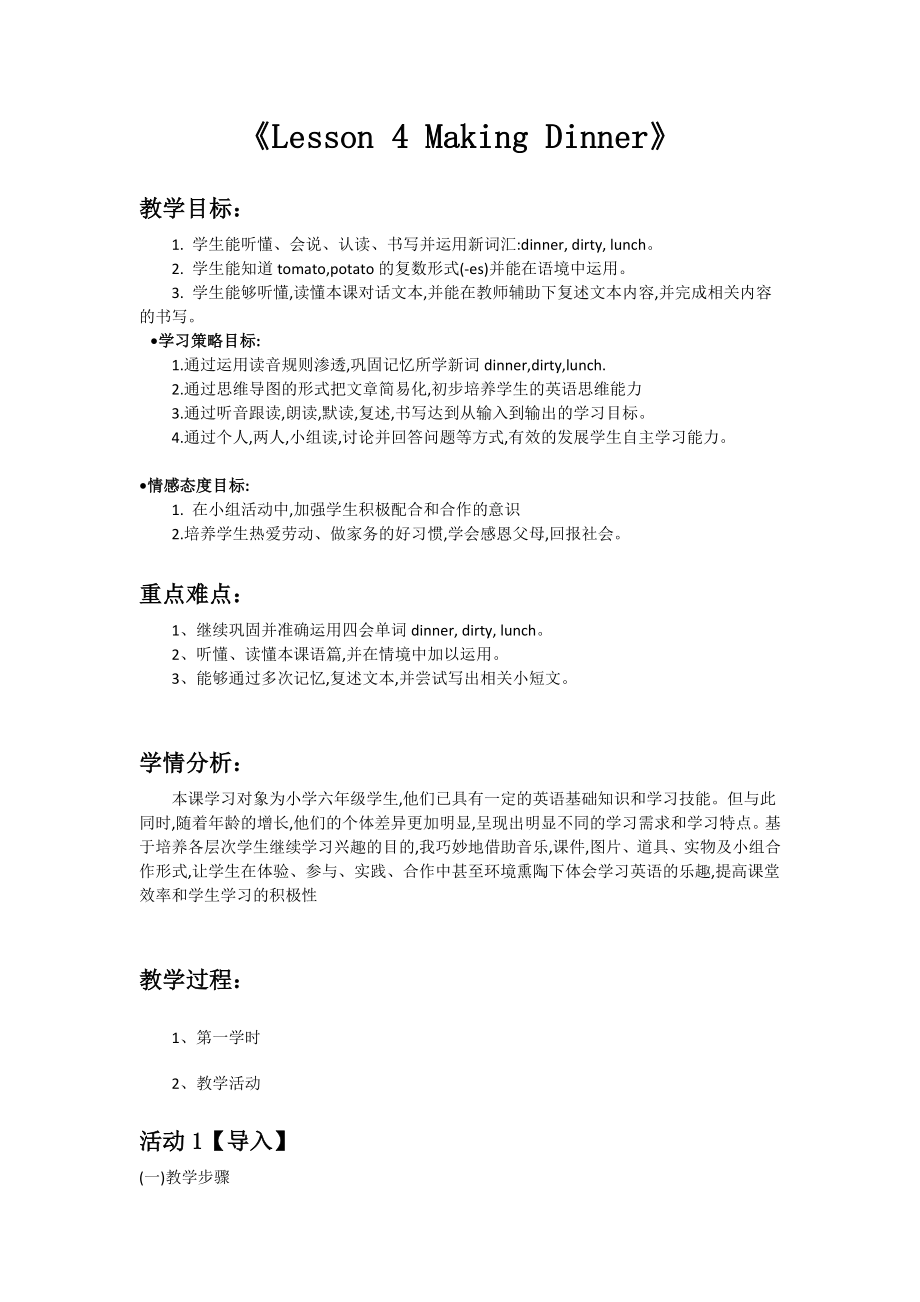《六年級下冊英語教案-Unit 1 Lesson 4 Making Dinner-冀教版》由會員分享�����,可在線閱讀�����,更多相關(guān)《六年級下冊英語教案-Unit 1 Lesson 4 Making Dinner-冀教版(3頁珍藏版)》請?jiān)谘b配圖網(wǎng)上搜索�����。
1�����、《Lesson 4 Making Dinner》
教學(xué)目標(biāo):
1. 學(xué)生能聽懂�����、會說、認(rèn)讀�����、書寫并運(yùn)用新詞匯:dinner, dirty, lunch。
2. 學(xué)生能知道tomato,potato的復(fù)數(shù)形式(-es)并能在語境中運(yùn)用。
3. 學(xué)生能夠聽懂,讀懂本課對話文本,并能在教師輔助下復(fù)述文本內(nèi)容,并完成相關(guān)內(nèi)容的書寫�����。
? ??學(xué)習(xí)策略目標(biāo):
? ? 1.通過運(yùn)用讀音規(guī)則滲透,鞏固記憶所學(xué)新詞dinner,dirty,lunch.
2.通過思維導(dǎo)圖的形式把文章簡易化,初步培養(yǎng)學(xué)生的英語思維能力
3.通過聽音跟讀,朗讀,默讀,復(fù)述,書寫達(dá)到從輸入到輸出的學(xué)習(xí)
2�����、目標(biāo)�����。
4.通過個(gè)人,兩人,小組讀,討論并回答問題等方式,有效的發(fā)展學(xué)生自主學(xué)習(xí)能力�����。 ? ? ? ? ? ? ? ?
?情感態(tài)度目標(biāo):
1. 在小組活動(dòng)中,加強(qiáng)學(xué)生積極配合和合作的意識
2.培養(yǎng)學(xué)生熱愛勞動(dòng)�����、做家務(wù)的好習(xí)慣,學(xué)會感恩父母,回報(bào)社會�����。
重點(diǎn)難點(diǎn):
1、繼續(xù)鞏固并準(zhǔn)確運(yùn)用四會單詞dinner, dirty, lunch�����。
2�����、聽懂�����、讀懂本課語篇,并在情境中加以運(yùn)用�����。
3、能夠通過多次記憶,復(fù)述文本,并嘗試寫出相關(guān)小短文�����。
學(xué)情分析:
本課學(xué)習(xí)對象為小學(xué)六年級學(xué)生,他們已具有一定的英語基礎(chǔ)知識和學(xué)習(xí)技能�����。但與此同時(shí),隨著年齡的增長,他們
3�����、的個(gè)體差異更加明顯,呈現(xiàn)出明顯不同的學(xué)習(xí)需求和學(xué)習(xí)特點(diǎn)�����?����;谂囵B(yǎng)各層次學(xué)生繼續(xù)學(xué)習(xí)興趣的目的,我巧妙地借助音樂,課件,圖片�����、道具、實(shí)物及小組合作形式,讓學(xué)生在體驗(yàn)�����、參與�����、實(shí)踐�����、合作中甚至環(huán)境熏陶下體會學(xué)習(xí)英語的樂趣,提高課堂效率和學(xué)生學(xué)習(xí)的積極性
教學(xué)過程:
1�����、第一學(xué)時(shí)
2�����、教學(xué)活動(dòng)
活動(dòng)1【導(dǎo)入】
(一)教學(xué)步驟
Step 1 Class-opening(3 minutes)
1.Enjoy some English songs.
2. Greeting?
設(shè)計(jì)思路:音樂使人振奮,精神,英語歌曲的播放為學(xué)生創(chuàng)造氛圍,將學(xué)生的注意力吸引到英語課堂學(xué)習(xí)中�����。
2. W
4�����、arming up
Watch PPT and say the words fast.(twice)
設(shè)計(jì)思路:利用30秒快速出圖調(diào)動(dòng)學(xué)生積極性,同時(shí)復(fù)習(xí)食物單詞,為下一步的free talk做鋪墊�����。
1. Free talk
It’s delicious!?
?What did you have for breakfast? I want to eat. ?I had an egg for breakfast. I’m hungry now. Listen ,Jenny is hungry too .What did she eat for lunch ?Let’s listen
5�����、.
設(shè)計(jì)思路:以早飯為切入點(diǎn),采用采訪的形式互相問候,激勵(lì)學(xué)生自由問答,促使他們在實(shí)際生活中運(yùn)用所學(xué)知識�����。
Step 2 New concepts (25 minutes)
1.?? ?Listen and answer?
屏幕出示問題,找學(xué)生讀問題)What did Jenny ate for lunch?
?(Students listen to the text fast and find the answer.)?
? ? 2. watch ,follow and answer ?
T:Class! I have more questions to ask you. (屏
6、幕出示問題)
(1) How many people are there? Who are they?
(2) What are they doing?
(Choose students from each team to read the questions.)
(Students read the text and underline the answers.)?
(Check the answers in group.)?
? ?(Choose students from each team to answer the questions.)找學(xué)生同時(shí)將答案板書貼于黑板。
7�����、設(shè)計(jì)思路:針對文本設(shè)計(jì)具有針對性問題,使學(xué)生通過回答問題理解文本。學(xué)生利用先跟讀再朗讀的方法進(jìn)行尋讀獲得答案,掌握讀的技能,體現(xiàn)了教師的“授漁”�����。小組內(nèi)互助核對答案,培養(yǎng)學(xué)生自主學(xué)習(xí)的能力。
2.?? ?Help Jenny’s mother make dinner ?
T: Let’s help Jenny’s mother make dinner. She needs some vegetables. Where are the vegetables? ( 屏幕出示問題)
( 接著屏幕出示西紅柿在冰箱圖片,同樣方式出示胡蘿卜土豆在桌子上圖片)?
(Students read and
8�����、 find the rules about potatoes and tomatoes.)學(xué)生試著發(fā)現(xiàn)以o結(jié)尾的名詞復(fù)數(shù)的規(guī)律,在教師的提示下加以總結(jié)�����。
T: Li Ming and Jenny like potatoes and tomatoes. Now dinner’s ready. I think it’s yummy. What do you want to say? What does Li Ming say?(屏幕出示語句并帶音頻)
設(shè)計(jì)思路:使用冰箱的道具,讓學(xué)生猜一猜蔬菜在哪里,冰箱里有什么,為課堂增添生活色彩。讓學(xué)生真正體驗(yàn)�����、參與,發(fā)現(xiàn),總結(jié),從而形成有效學(xué)習(xí)策略�����。
9�����、? ? 4. Listen, read and answer
After dinner... (屏幕出示問題)
What is Mr.smith doing??
Who help him ?
(Choose students from each team to read the questions.)讀完第一個(gè)問題屏幕出示臟盤子圖片�����。
(Students read by themselves and write the questions.)?
(Check the answers in group.)?
(Choose students from each team to answer the questions.)教師同時(shí)將答案板書于黑板�����。
 六年級下冊英語教案-Unit 1 Lesson 4 Making Dinner-冀教版
六年級下冊英語教案-Unit 1 Lesson 4 Making Dinner-冀教版

